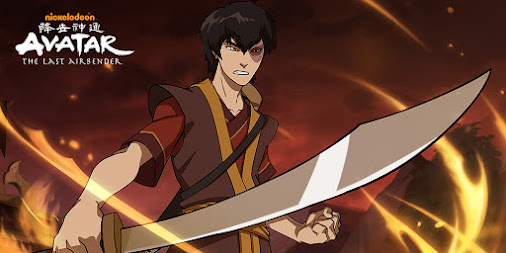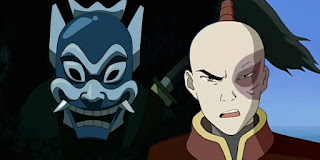The honorary title of this blog is, “Honoring the Honorable Way of Honor, Honorably, Your Honor.”
Just wanted to make sure we understand that Zuko cares about one thing.
And that’s capturing the Avatar.
Why?
Because he is missing something he needs to regain.
You guessed it.
Is regaining your honor such a bad thing? In Zuko’s case, it’s the fuel for a maddening obsession, and the central theme of his daddy issues. He’s totally blinded to the fact that he spends two books of ATLA on a quest that's nothing more than a mockingly titled banishment. He and Uncle Iroh are a pair of royal outcasts, together in their disgrace and their longing for family who have either died, disappeared, or dismissed them.
Zuko believes he needs his father to restore to him what he lost at their agni-kai, the fateful day he signed his hatred on Zuko’s face with fire. He believes to recover means to reclaim his rightful place on the throne.
And then Zuko does the impossible and captures the Avatar at the North Pole. So why does he wanders off into the tundra? When Azula attempts to take him in, Zuko and Iroh escape and live on the run. Zuko learns that he will never find the honor that he hoped he would find from his father. He and Uncle Iroh take knives to their top-knots, and travel in disguise, branded as traitors to the fire nation. Then at Ba-Sing-Se when Azula and Zuko battle the Avatar team, Zuko bears the weight of a shared secret, that they did not actually kill the Avatar, as they tell their father they did. He also is crushed by the knowledge that his return to the throne was bought with Uncle Iroh's incarceration.
That’s rough, buddy.
Ba-Sing-Se, is a very important moment for Zuko, though, and the progress Zuko shows here gives the viewer a sense that when Zuko returns to the Fire Nation, there is still hope he won't follow in his father's fascist footsteps. Zuko learns that the Avatar is present in Ba-Sing-Se, but he follow’s Uncle Iroh’s advice, and lets him go. This decision actually causes Zuko to get sick for a few days, and Iroh nurses him back to health while he rests in the back of their little tea shop. When he wakes up, it’s as if he is transformed into a new person. Someone who is capable of being a whole human. He goes on a date. He begins to envision a life that has nothing to do with the Avatar. This is a signal of major healing from his ‘daddy issues,’ more so than cutting off the top knot. Rather than trying to fill the emptiness in him by getting Ozai’s approval, Zuko begins to ask himself what he, himself, approves of. He fights his way to move beyond his traumatic childhood, and determines to break the mold set for him by choosing to live differently.
The way I would describe Zuko’s transformation in a phrase is a shift from external validation to internal validation. Childhood is a time where we don’t have the development necessary to provide ourselves internal validation. We have to rely on the adult role-models in our lives to know how to be in the world. Our internal sense of right and wrong is heavily influenced by the values that those role models demonstrate through their actions. Later, as our brains develop we begin to have the words and cognitive tools to truly choose for ourselves, if we choose to. While the mold set by our parents and role models is strong, it's not impossible to break. Living by internally validated models make it possible to be free from toxic patterns set by a traumatic family of origin.
Speaking of toxic families, Zuko was torn between two very different parents. His inner conflict manifests in his highly unstable mood, and his poor planning of events. He has trouble making up his mind because the path of Fire Nation supremacy is full of holes, but he refuses to fully acknowledge them.
Zuko finds his honor, but not with Ozai. He finds the honor that his mother, Ursa, and Uncle Iroh intended for him to find. He finds out that there was nothing to regain from Ozai but abuse, neglect, and despair. He finds that when Azula is defeated, her effortless poise and perfection were a mask for emptiness and total, sociopathic isolation. Zuko finds that his worth never came from his throne, his bending skills, or his father's approval. Despite Zuko’s journey across the spectrum from enemy to ally of the Avatar, his worth was always totally clear to the Uncle who had adopted him as his own.
Zuko not only becomes a whole person capable of connecting with people, he is willing to apologize, make amends, and fight for truth. Holding fast to his new way of living means saying goodbye to Ozai and Azula. He is able to face the unknown, living amongst a group of misfits and strangers, and finding his way to the throne that echoes his grandfathers, Avatar Roku and Firelord Sozin, and hints at an intergenerational healing of their failed friendship. The unfamiliarity of his new world view is bearable because he has finally learned to follow deeper values. Like Iroh and Ursa, his estrangement and loneliness don’t lead to isolation. He finds honor through trust, vulnerability, and empathy. Zuko is no longer chained to his inner emptiness because he has let go of the quest to fill it.
“I’ve realized I’m free to determine my own destiny, even if I’ll never be free of my mark.” -Zuko
Determine your own destiny. That is a quest worth becoming obsessed with.




No comments:
Post a Comment